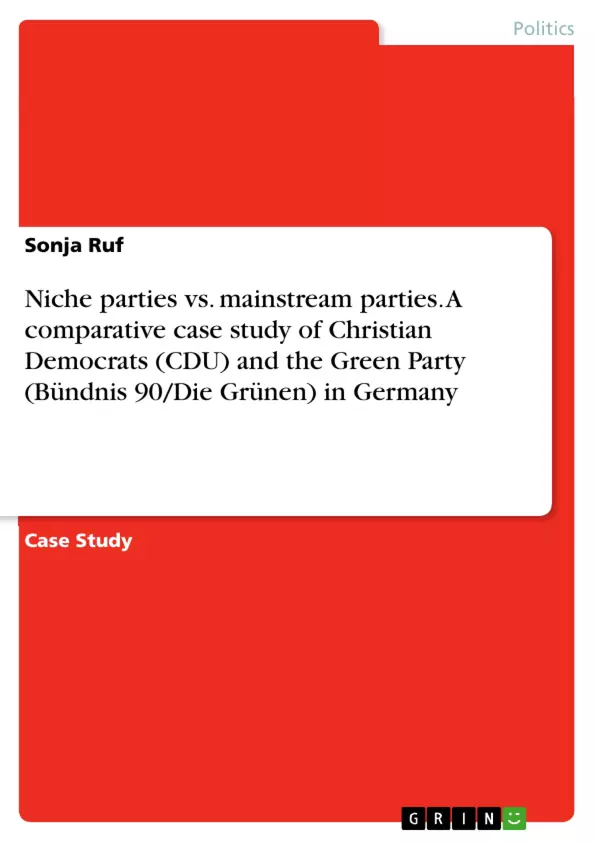Do niche parties include a higher value of their partybase and more opportunities of grass-root decision-making in their organizational framework?
To find an approriate answer to this research question, a comparative case study is conducted. The two cases are represented by two parties, namely the german green party; Bündnis 90/Die Grünen, symbolically standing for a niche party and the german christian democratic party; CDU, standing for a typical mainstream party in Germany. The method of the presented analysis follows a qualitative approach. In consists more specifically in a qualitative content analysis after Udo Kuckartz, in which data about the organizational framework of both parties will be analysed.
Ezrow et al. 2011 suppose that, the organisational framework of niche parties could offer a greater base for a close relationship between partybase and partelites due to more integrated mechanism of grass-root decision-making.
Inhaltsverzeichnis (Table of Contents)
- 1 Introduction
- 2 Theoretical framework
- 2.1 The niche party concept
- 2.2 The basic theoretical framework
- 3 Research design
- 3.1 Case-selection
- 3.2 Methodological framework
- 4 Analysis
- 4.1 The statutes of Bündnis 90/Die Grünen
- 4.2 The statues of the CDU
- 5 Synthesis: Results
- 6 Conclusion
Zielsetzung und Themenschwerpunkte (Objectives and Key Themes)
This research paper examines the relationship between niche parties and mainstream parties in Germany, focusing on the organizational framework and intra-party decision-making processes. Specifically, it aims to answer the question: Do niche parties incorporate a higher value of their partybase and more opportunities for grass-root decision-making in their organizational framework?
- The concept of niche parties and how they differ from mainstream parties.
- The role of intra-party decision-making processes in shaping party behavior.
- The differences in organizational structures between niche and mainstream parties.
- The impact of intra-party democracy on the representation of civil interests.
- The case studies of Bündnis 90/Die Grünen (niche party) and the CDU (mainstream party).
Zusammenfassung der Kapitel (Chapter Summaries)
- Chapter 1: Introduction This chapter introduces the research question, outlining the significance of understanding intra-party structures and their impact on democratic representation. It highlights the need to explore the differences in decision-making processes between niche and mainstream parties.
- Chapter 2: Theoretical Framework This chapter delves into the theoretical framework underlying the research. It defines the concept of niche parties and explores various perspectives on their characteristics and behavior, contrasting them with mainstream parties.
- Chapter 3: Research Design This chapter describes the research design, outlining the case selection of Bündnis 90/Die Grünen and the CDU, and explaining the methodological framework of qualitative content analysis used to analyze the parties' organizational structures.
- Chapter 4: Analysis This chapter presents the analysis of the statutes of both parties, focusing on their organizational frameworks and highlighting key differences in their structures and decision-making processes.
- Chapter 5: Synthesis: Results This chapter synthesizes the findings of the analysis, drawing comparisons between the two cases and highlighting the implications of the results for the research question.
Schlüsselwörter (Keywords)
This research paper focuses on the key themes of niche parties, mainstream parties, intra-party decision-making, organizational framework, democratic representation, qualitative content analysis, Bündnis 90/Die Grünen, and the CDU. These keywords encapsulate the primary concepts and research areas explored in the study, providing a concise overview of the core topics investigated.
Frequently Asked Questions
What is the difference between a niche party and a mainstream party?
Niche parties (like the Green Party) typically focus on specific issues and have distinct organizational frameworks, while mainstream parties (like the CDU) appeal to a broader electorate and often have more established, hierarchical structures.
Do niche parties offer more grass-roots decision-making?
The research examines whether niche parties prioritize their party base more and provide more opportunities for grass-roots involvement compared to mainstream parties.
Which parties are used as case studies in this research?
The study compares Bündnis 90/Die Grünen (representing a niche party) and the CDU (representing a mainstream party) in Germany.
What methodology was used for this analysis?
The study employs a qualitative content analysis based on Udo Kuckartz's method, specifically analyzing the statutes and organizational data of both parties.
How does intra-party democracy impact representation?
The paper explores how internal decision-making processes and the inclusion of the party base affect how civil interests are represented in the political system.
What are the "statutes" of a party?
Statutes are the formal rules and organizational frameworks that define how a party is structured and how internal decisions are made.
- Citation du texte
- Sonja Ruf (Auteur), 2023, Niche parties vs. mainstream parties. A comparative case study of Christian Democrats (CDU) and the Green Party (Bündnis 90/Die Grünen) in Germany, Munich, GRIN Verlag, https://www.grin.com/document/1353781



